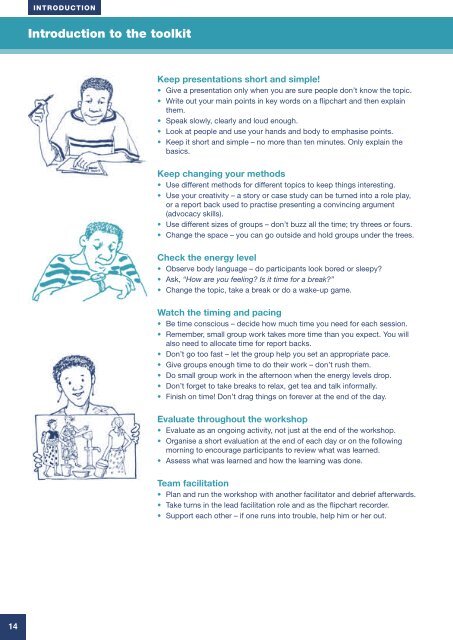Understanding and challenging HIV stigma - Introduction ... - ICRW
Understanding and challenging HIV stigma - Introduction ... - ICRW
Understanding and challenging HIV stigma - Introduction ... - ICRW
You also want an ePaper? Increase the reach of your titles
YUMPU automatically turns print PDFs into web optimized ePapers that Google loves.
INTRODUCTION<br />
<strong>Introduction</strong> to the toolkit<br />
Keep presentations short <strong>and</strong> simple!<br />
• Give a presentation only when you are sure people don’t know the topic.<br />
• Write out your main points in key words on a flipchart <strong>and</strong> then explain<br />
them.<br />
• Speak slowly, clearly <strong>and</strong> loud enough.<br />
• Look at people <strong>and</strong> use your h<strong>and</strong>s <strong>and</strong> body to emphasise points.<br />
• Keep it short <strong>and</strong> simple – no more than ten minutes. Only explain the<br />
basics.<br />
Keep changing your methods<br />
• Use different methods for different topics to keep things interesting.<br />
• Use your creativity – a story or case study can be turned into a role play,<br />
or a report back used to practise presenting a convincing argument<br />
(advocacy skills).<br />
• Use different sizes of groups – don’t buzz all the time; try threes or fours.<br />
• Change the space – you can go outside <strong>and</strong> hold groups under the trees.<br />
Check the energy level<br />
• Observe body language – do participants look bored or sleepy?<br />
• Ask, “How are you feeling? Is it time for a break?”<br />
• Change the topic, take a break or do a wake-up game.<br />
Watch the timing <strong>and</strong> pacing<br />
• Be time conscious – decide how much time you need for each session.<br />
• Remember, small group work takes more time than you expect. You will<br />
also need to allocate time for report backs.<br />
• Don’t go too fast – let the group help you set an appropriate pace.<br />
• Give groups enough time to do their work – don’t rush them.<br />
• Do small group work in the afternoon when the energy levels drop.<br />
• Don’t forget to take breaks to relax, get tea <strong>and</strong> talk informally.<br />
• Finish on time! Don’t drag things on forever at the end of the day.<br />
Evaluate throughout the workshop<br />
• Evaluate as an ongoing activity, not just at the end of the workshop.<br />
• Organise a short evaluation at the end of each day or on the following<br />
morning to encourage participants to review what was learned.<br />
• Assess what was learned <strong>and</strong> how the learning was done.<br />
Team facilitation<br />
• Plan <strong>and</strong> run the workshop with another facilitator <strong>and</strong> debrief afterwards.<br />
• Take turns in the lead facilitation role <strong>and</strong> as the flipchart recorder.<br />
• Support each other – if one runs into trouble, help him or her out.<br />
14

















